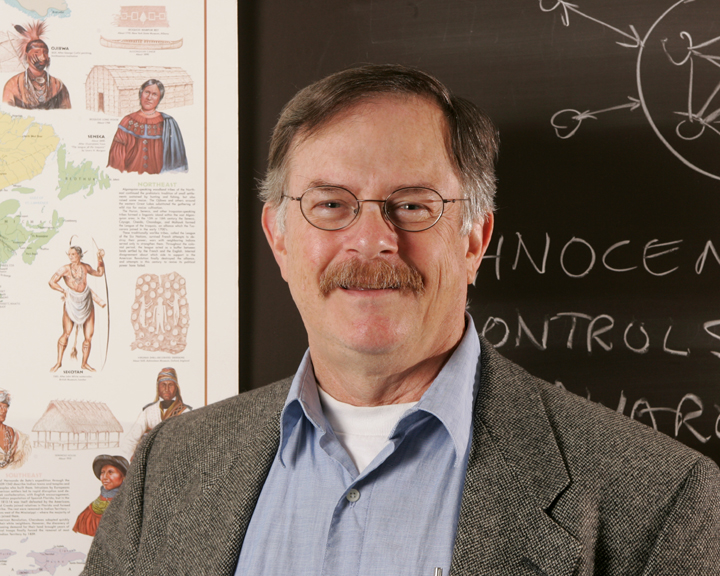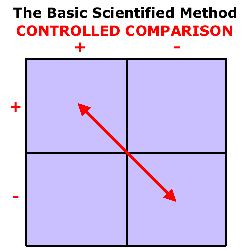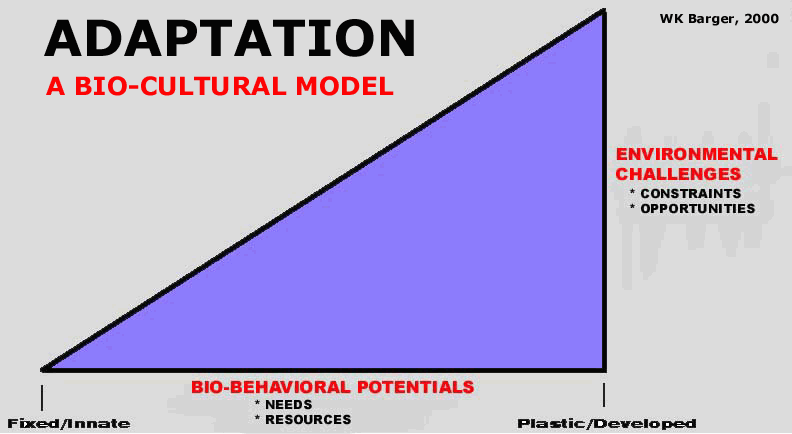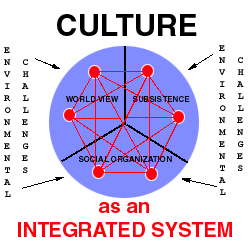
Ken Barger
Professor Emeritus of Anthropology
Indiana University Indianapolis
kbarger@iu.edu
CORE CONCEPTS
IN
UNDERSTANDING THE HUMAN EXPERIENCE
.jpg)
A wedding celebration in a Zopotec village in the mountains of Oaxaca,
Mexico. My goddaughter and her family in Mexico City went to the wedding of her cousin, as did
other members of the extended family, including several people have migrated to the United States. Since
as a godfather I was now included in the "family", it was assumed that the wedding celebration also involved
me, which both surprised and pleased me. European Americans have a pattern of a nuclear family, and, though
we may go to the wedding of a cousin with whom we are close, we are typically not close to relatives more
distantly related, particularly in a mobile society. In better understanding the importance of the extended
family in other societies, I had to ask: What are the adaptive functions of "family" in their culture,
as well as the functions of the nuclear family in my own experience?
There are several key concepts involved in Science, the Social Sciences, and Anthropology which can
help us better understand the human experience, as we compare our own cultural experience with others.
SCIENCE
and
Principles for Understanding Natural Phenomena
Science often seems abstract and beyond the reach of most people in their
daily lives, but we have all have to develop our understandings of Life and the Universe as we go through
our lives. Following the basic principles of science can help us develop more valid, reliable, balanced,
and predictive understandings of life around us, which include:
- Science is the study of natural phenomena (including the human experience).
- The purpose of science is to develop and validate more balanced and predictive understandings
of life events and issues.
- The principles of science can help us all be more valid and balanced learners.

The basic scientific method is controlled comparison.
As we compare similarities and differences across phenomena, we can determine what relationships and
influences exist in life events, and also which suspected or perceived ones are not valid. For
example, do those who smoke more have higher rates of lung cancer?
The basic ethnological method is cross-cultural
comparison, as we compare different cultural patterns in order to determine what factors
influence the human experience.
Valid and balanced understandings are based on recognition and control
of biases (rather than the absence of biases) as we ask questions, gather relevant information,
identify relationships and influences, and make and support predictive interpretations about life events
and issues. Biases always exist, as we are exposed to and develop certain ways of thinking. For example,
Latin languages have gender built into nouns, so speakers have formed their language neurons to build in
"masculine" and "feminine", while we English speakers find it somewhat strange to think of a house or
floor in terms of "she" and "he". The trouble is that these ways of thinking are so "natural" that we
are not even aware that we are being biased.
The types of biases that influence how valid, reliable, and balanced our understandings are include:
- Conceptual biases: the way we as a group collectively
organize our mental views, beliefs and perceptions about life and the universe,
which influences what we notice, what we seek to learn, and how we interpret phenomena. For example,
how does our language structure what we think of as "real"?
- Methodological biases: the way in which we ask a question (or not),
select, gather, and analyze information, all of which structure the basic materials
we use and do not use for developing our understandings. For example, how does talking with people we
know compared with others we do not know influence what we believe?
- Situational biases: the structured local settings and
circumstances around us, which influence what information and events are and are not
available to us in understanding issues. For example, how does not speaking the native language
of another people influence our understanding of international relations?
- Personal biases: the individual experiences and
personality characteristics that form our interests, likes and dislikes, and way of
interacting with others and life circumstances, which influence what and how each of us seeks
to learn and understand... or not learn and understand. For example, how does the "happy" and
"unhappy" experiences in our childhood influence our feelings about other people?
- Chance biases: the random circumstances and events that cannot be
anticipated and controlled beforehand, but which provide and deny information for our understanding of
life and the universe. For example, how does a tragic accident influence our relationships with others?
Biases enter into all of our understandings, from our perspectives on what
we are seeking to learn and in the questions we ask, the information with which we have to work, the
interpretations we make, and the judgments we make throughout the learning process.
- Can we recognize our biases (rather than assuming we are being "objective")?
- Why do we have these biases?
- What can we do to ensure that our understandings of other people and ethnic
behaviors is accurate and balanced?
The principles of science that all of us can use to help develop more
valid and balanced understandings of life events and issues include:
- Recognize and control for biases
throughout the learning process.
- Keep the facts separate from the
interpretations of those facts.
- Interpret what we do know in the
context of what we do not know.
So grounded scientific understandings are based on being conscious about what we know
and do not know:
- In gathering relevant, valid, and balanced information.
- In analyzing relationships between factors and influences ("connecting the dots").
- In making interpretations based on factual information and supported evidence.
With this awareness, we can maximize our chances for obtaining more
valid and reliable information, for making grounded interpretations,
and, perhaps most important, qualifying our interpretations to
acknowledge where they are and are not relevant and predictive.
HUMAN'S PLACE IN NATURE
and
Principles for Understanding Evolution of Life Forms
Humans are only one of the millions of life forms on earth. Where do we
stand in the natural order of things? Have we evolved beyond other life
forms? Do other life forms and natural resources exist for our sole use?
Are we totally separate from Nature and able to control our destiny? Or are
we a part of Nature, and subject to the natural laws of the Universe
around us? For example, pesticides affect the biology of "weeds" to kill them,
so how likely are these products to affect other life forms... including us?
Some concepts in Evolution can help us to better understand our place in
Nature, including:
- Biological evolution is a change
in the frequency of genes in a
population over time. This definition focuses
on genetic potentials, rather than physical forms.
- The basic mechanism of biological evolution is
natural selection, where the carriers
of those genes which are more adaptive to environmental conditions
pass on those genetic potentials in greater frequency over generations.
- Diversity is adaptive,
because the more different types of traits in a group the
more likely the group will have the necessary potentials to meet
environmental challenges, particularly new and unforeseen conditions.
- The two aspects of the phenotype (the expression of genetic potentials)
are morphology (biophysical traits and processes) and
behavior (active/reactive functions of organisms).
Two important concepts which should be kept distinct are: race,
which refers to the genetic frequencies in a
population at a particular point in time, and ethnicity, which
refers to the behavioral patterns of a group.
Therefore, different races may share a similar ethnic heritage (like religious beliefs),
and groups within the same race may have different ethnic heritages (as seen when people
move around the world and learn new cultural patterns). Also, we need to keep in
mind that all humans in the world share over 99.9% of our genes... and that we
are far more alike than any differences we may notice.
- As we compare ourselves with other species on Earth, we can see that humans
share many morphological and behavioral traits with other life forms, from
single cell organisms, to vertebrates, to mammals, to primates and great
apes. Thus we need to ask how much are we similar to other life forms,
as well as different.
- We can also see that humans have some morphological and behavioral traits
that are relative enhancements of particular traits, including brain structures,
reproductive behavior, verbal communication, and abstract and integrative thinking.
What distinguishes humans, then, is more in terms of degree of potentials
compared to other life forms, rather than unique traits.
- As we trace the course of hominid evolution over the last million or so
years, we can identify some trends that distinguish us as a species:
- Humans have evolved a great capacity learning.
- Given this, one of our primary means of adaptation is by
culture (learned behavior).
ADAPTATION
and
Principles for Understanding the Reorganization of Interacting Systems
The concept of adaptation provides many insights into understanding
the driving forces that initiate and direct morphological and behavioral
changes on Earth, including changes among humans around the world today.

Principles for understanding the process of adaptation include:
- Adaptation is the
systems process in how a group's
bio-behavioral potentials interact
with its environmental challenges,
which enhances its survival and continuation.
This process involves the biological and cultural systems of
a group in its environmental context.
The principle of systems is important in
the anthropological perspective, and includes:
- Components: Asking what are the different parts that
are included in the system?
- Interactions: Asking how these different components are
interrelated and mutually influence each other?
- Outcomes: Asking what are the results from how all
the interacting components in the system function together?
Changes in one part of the system not only affect other parts but also
the functioning balance of the whole system.
- Cultural adaptation is the systems process in how a group's
behavioral potentials interact with its
environmental challenges, which enhances its survival and continuation.
- A bio-cultural model of adaptation involves a
SYSTEMS
process of two sets of interacting forces, including:
- The internal potentials that a group
brings to a setting, including its needs (conditions
necessary for its existence) and resources (abilities
which can be used to enhance the group's adaptation).
- Potentials can range from fixed/innate to highly
plastic/developed; and the ultimate criterion
for assessing the plasticity of a trait is how much it can
be changed in interaction with
the environment. (The degree of observed variations can provide
an intermediate estimate).
- A group's potentials are ultimately based in its genetic
heritage (such as the structure of the brain).
- Diversity is adaptive, because the more different
types of traits in a group the more likely the group will have
the necessary potentials to meet environmental challenges,
particularly new and unforeseen conditions.
- A major adaptive resource for humans is culture. Humans have
enhanced potentials for developed behaviors (rather than being
limited to specific fixed behaviors. Plastic behavioral potentials
can be readily changed in meeting environmental conditions,
and therefore provide a more rapid and flexible means of adaptation
(compared to evolving physiological traits over millions of years).
- The environmental challenges
in the group's setting, including constraints (conditions
imposed by the environment which are necessary for existence) and
opportunities (conditions which can be used to enhance
the group's existence).
- Environmental challenges select from among all of a group's
potentials those traits that contribute to the best adaptive balance.
- The basic process of adaptation is
reorganization of the system, as a group's potentials interact
with its environmental challenges. It is the
system that changes, not just traits. Adaptation is a
continuous evolutionary process, where populations evolve
(rather than just individuals).
- The ultimate measure of the adaptiveness of a trait is
how much it contributes to the continuation
of the group. (Intermediate measures of the well-being of a group which
promotes continuation are also often used, such as health.) Adaptation
is a relative process, in terms of more or less optimal
functioning of a group and its greater or lesser balance with
environmental conditions.
- In assessing adaptation, time frames must be kept in mind, since what
is adaptive at one point may be maladaptive under altered conditions, and
what is not adaptive at one time may be more adaptive under altered conditions.
- Understanding the PROCESS of adaptation
can help us better understand contemporary issues. Asking poor questions
can lead to misunderstandings (like "nature or
nurturance?"... where the more valid issue is "nature
and nurturance; how much of each?").
CULTURE
and
Principles for Understanding Ethnic Behavior
The concept of culture is a major perspective in Anthropology
for understanding human behavior, and provides many insights into
understanding the wide range of ethnic behavior we can observe
around the world.

Principles for understanding the integrated natural of cultural behavior
include:
- Culture is the whole,
learned, and
shared behavioral system
of a group of people.
- Culture is an integrated
system, where every trait mutually interacts with every
other trait directly or indirectly.
The systems perspective is important in the
questions to ask about a culture:
- What are the components or traits of the cultural system?
- How do these different traits interact and mutually influence
each other?
- What are the outcomes or adaptive functions that result
from these interacting traits?
- The levels of cultural experience include:
- The meanings (what people believe and
how they feel about their life and ways), and
- The adaptive functions (how behavioral traits
contributes to the group's continuation). For example, we need to ask:
- What are the Biological functions? How do these behaviors
promote the physical well-being and reproductive success of the group?
- What are the Subsistence/Economic functions? How do these
behaviors contribute to meeting a group's basic material needs which support its way of life?
- What are the Social functions? Show do these behaviors foster
cohesion within a group and minimize conflicts and disruptions among its members?
- What are the Psychological functions? How do these behaviors
support a meaningful identity, a constructive sense of purpose, and a productive orientation
towards life among members of the group?
- What are the Ecological functions? How do these behaviors
facilitate a productive balance with the group's external conditions?
- Cultures are relative,
so that each culture has to be considered in the context of its
own behavioral system and the challenges in its environmental conditions.
- It is misleading to look at others' ways as "similar"
or "different" than our own, because we are limiting our
understandings by our own experience rather than their integrated system.
- To gain more valid understandings, we need to consider a particular culture
as distinct in terms of how their behavioral system is organized in response
to their life conditions.
- Cultures are dynamic, and are always
changing to maintain a functioning balance with environmental conditions. No culture is
in perfect balance and so is always adjusting to maintain optimal functioning. The learned
behaviors involved in human culture are largely flexible, and therefore can be readily
modified and developed in adapting to environmental conditions. When a culture faces
extreme imbalances, it must make greater adjustments to restore a functioning balance...
or face extinction as a society. As we look at history, how many cultures no longer exist,
even thought the people may have survived?
- So we need to ask: how do changes in one part of the system affect other parts and
the balance of the functioning whole?
When we look at a culture as as a fluid system trying to maintain an optimal balance with the
conditions of the group's environmental conditions, then we can develop more complete and relevant
understandings of why that group has particular patterns of behavior.
This includes our own culture.
ETHNOCENTRISM
and
Principles for Understanding Interethnic Misunderstandings
One of the most important concepts in Anthropology is ethnocentrism. The long history
of humans misunderstanding other humans is obvious. Ethnocentrism is a severe bias that
often leads to extreme conflicts and discrimination against other groups... and even genocide.
While contemporary events can make us all aware of such abuses, we can recognize the underlying
problems in our own society where we experience many forms of prejudice every day.
Principles for understanding the underlying causes of ethnocentrism, and, more important,
how to recognize and control for this bias, include:
- Ethnocentrism is making false
assumptions about others' behavior based
on our own limited experience.
- This definition goes way beyond the usual definition of "believing your own culture
is the best"... which infers that we are flawed for thinking that what we have already
experienced applies to everyone else. Since our own experience is the basis of our
"reality", everybody is ethnocentric, and it is impossible not to
assume false negative and false positive interpretations of other people.
- So it is natural to be ethnocentric, but it is not OK! Why?
- The basic problem with ethnocentrism is that it leads us to
misunderstand others. We see their ways in terms of our life experience, not in
the context of their life experience. A severe form of ethnocentrism is seen in racism and,
in the extreme, "ethnic cleansing". But even when people have benign intentions, they still
may convey to others that they are not "normal" and thus cause ill feelings and suffering.
Underlying all this is the fact that we do not understand their experience, and are therefore
prone to misjudge their ways.
- This presents a paradox: we assume (and therefore misunderstand others) because we
do not even understand that we do not understand, and so we aren't even aware that we can develop
more valid and balanced understandings about how they experience life.
SO WHAT CAN WE DO? The scientific principle that grounded understanding
is not based on the absence of biases but rather on the recognition and control of biases
applies to ethnocentrism. Since it is impossible not to be ethnocentric, the best way we can
control for ethnocentrism is:
- To recognize our ethnocentrism when it happens, by being aware of
reactions (both ours, which tells us about ourselves, and theirs,
which also tells us about our own assumptions). We react because something doesn't fit our own
"reality", and therefore see their ways either as negative (because it is "worse"
than what we think is normal) or as positive (because it is "better" than what we
think is normal).
- To ask valid questions that will lead to more valid and balanced understandings, in particular:
- "What are the meanings of the behaviors to them?"
That is, how do they think and feel about the matter?
- Even more important, "What are the adaptive functions of
their behaviors as they try to adapt to life conditions?"... remembering that the functions may
be in a very different part of culture than the meanings (where, for example, the meaning may concern
religion, but the function may be psychological).
- This is the question which usually gives us the deepest insights into cultural behavior.
We do not have to agree with others' ways, of course, and have the right to our own ways. But having valid
understandings of the meanings and functions of others' behavior can help in maintaining constructive
understandings, whether on an interpersonal, societal, or international scale. And in cases of conflict,
asking these questions can help negotiate mutually satisfying solutions that serve both our and their needs...
as has often been done throughout history (in contrast to forcing others to do things our way, also evident
throughout history).
Interethnic encounters and even conflicts, then, can be an opportunity for
better understanding the broad potentials humans have for being human... as well as better understanding
ourselves. This awareness keeps us open to new ways in which we ourselves can better meet
life challenges, since all human potentials around the world are also available for us in adaptation.
For a more comprehensive discussion of this concept, see Ethnocentrism.
These ideas emerge again and again in trying to gain a more accurate and balanced understanding of others'
ethnic behavior, as well as our own ways. These concepts can also help us better understand why variations
in the human experience are so evident in both our own and other societies around the world. In the larger
and exciting perspective, we can also realize the vast human potentials for meeting life challenges.
Expanding our understandings of our own and others' human behavior involves critical thinking. For more
guidelines on this process, see:
I hope that this discussion is useful as we seek to build understandings with others in life on how to
continually adapt to life conditions and challenges. We don't always have to agree, of course, but if we
can understand the views and concerns of each other we can seek mutually positive and beneficial relations.
Please note that I am now retired, so am not maintainnig this discussion on a regular basis.
Ken Barger
No personal information is collected on this and related web materials.
© Ken Barger, 2024.
These materials may be used in your own personal learning, though I'd appreciate your
giving me credit where appropriate.


.jpg)


